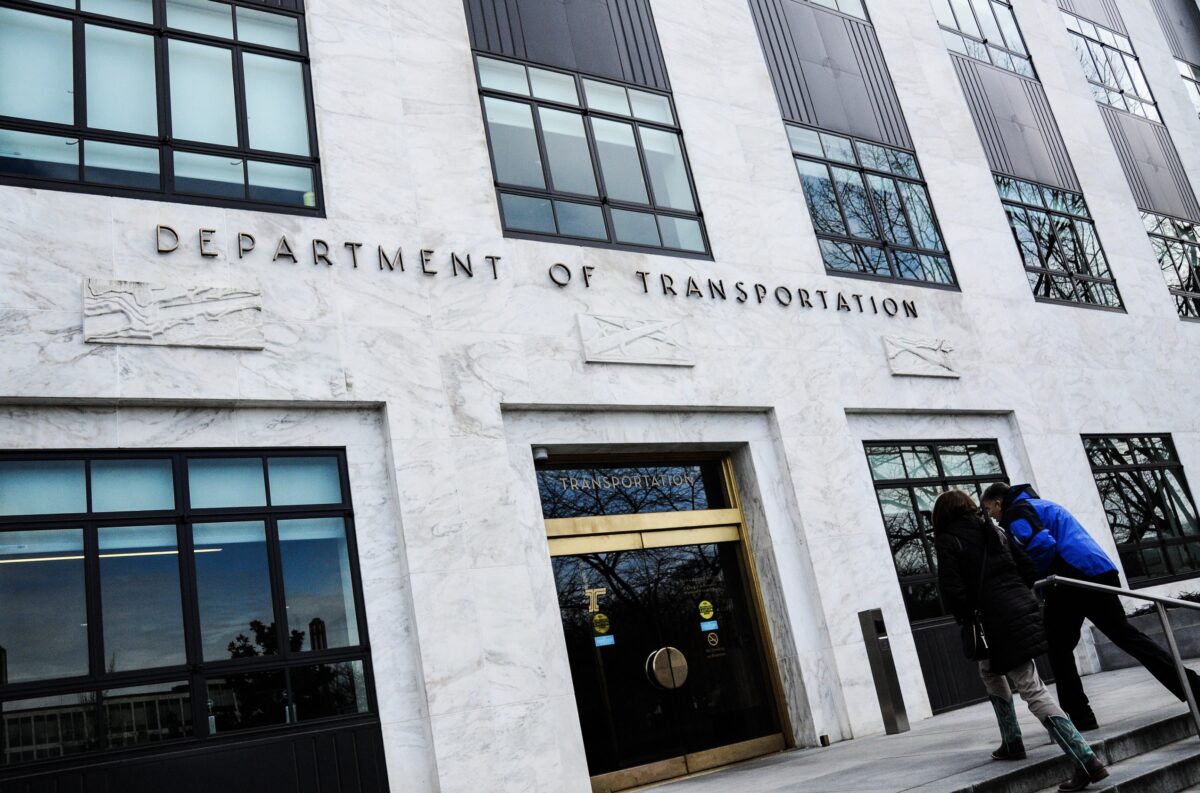
“It’s not a public involvement campaign. It’s a PR campaign. [This project] is deeply unpopular, and ODOT has to work really hard just to spin it as anything but.”
– Alan Kessler, lawyer
The Oregon Department of Transportation has wanted to get its I-5 Rose Quarter expansion done for well over a decade, but a host of challenges have gotten in the way of construction for the $1 billion project. Among the thorns in ODOT’s side are local transportation and climate advocates, who have sounded the alarm on things they say ODOT has been misleading the public about while the agency vehemently defends the project’s popularity.
These advocates have recently received good news in the form of a ruling issued by a Marion County judge earlier this week that detailed major ODOT missteps in how they handled a public records request .
This ruling concludes a lengthy saga that began when Portland lawyer Alan Kessler attempted to find out some details about what went on behind the scenes of a 2019 ODOT report outlining public comment they received about the Rose Quarter project. When he finally received the documents he’d requested, however, Kessler knew they weren’t up to snuff.
Related: ODOT says US DOT Sec Pete Buttigieg will be Oregon’s ‘new best friend’
“A lot of stuff was cut out,” Kessler told BikePortland on a phone call earlier this week. “They deleted most of the most of the substantial stuff from this Word document, edited some words to make it look like it was a real document, and then made a PDF of it and sent it to me.”
ODOT officials admitted they created a new document in response to Kessler’s public records request, which is not normal for a public agency to do. They may redact certain pieces of information, but that should be disclosed to the recipient by the presence of black boxes in the document and notes about the redactions. In contrast, ODOT didn’t tell Kessler about the edits they made to the document he received – they presented it as if it was fully intact in its original form.
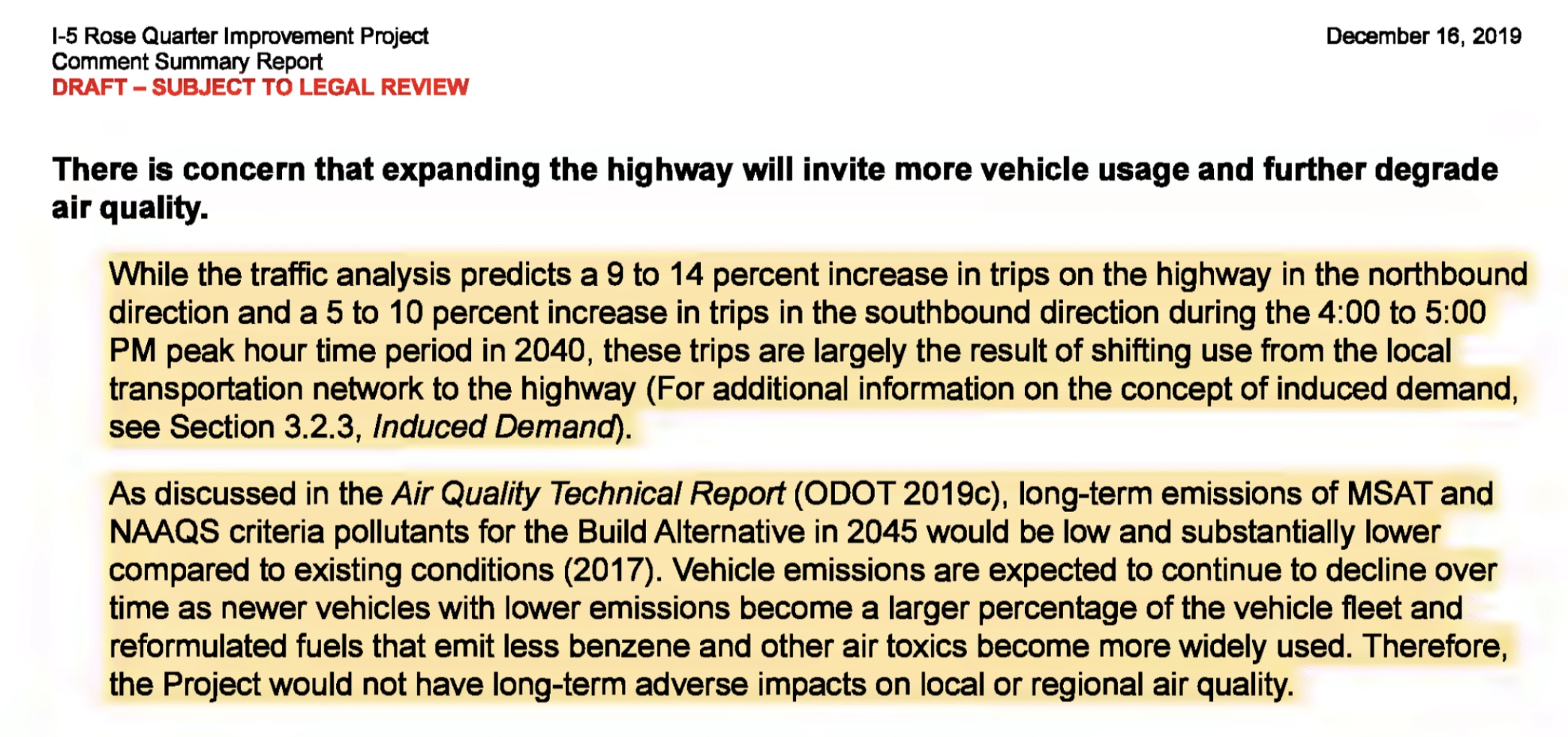
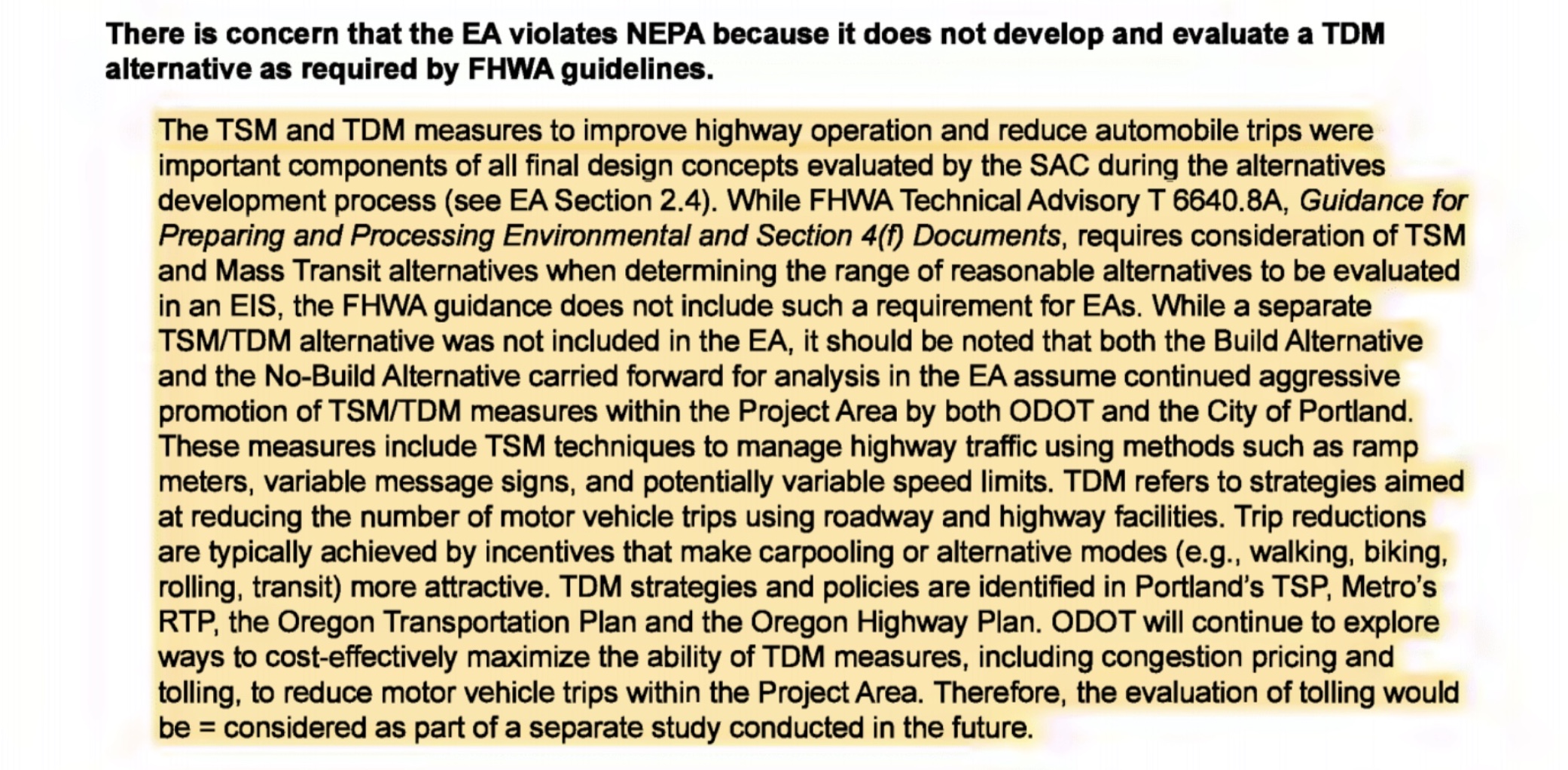

Kessler received summaries of what members of the public told ODOT their concerns were about this freeway expansion back in 2019. What the agency removed mainly concerns ODOT’s own responses to these concerns that they used to justify moving forward with their project anyway. After some back and forth, Kessler finally received this document (the highlighted parts are what was originally omitted).
Portland attorney Charley Gee, who represented Kessler in his lawsuit against ODOT, says this practice is unheard of.
“They deleted the information and created a whole new document,” Gee told BikePortland. “I’ve never seen this. I don’t know if anybody’s ever done it before.”
“We made a mistake and are committed to improving. We are reviewing our Public Records Requests processes and trainings to ensure we follow the law and provide timely and accurate records to the public.”
-ODOT Communications Director Kevin Glenn
Why did ODOT do it?
When Kessler originally called on ODOT to explain their omissions, they said they were only required to provide records pertaining to his original request, which pertained only to the public’s concerns about the project. But why would ODOT take the time to craft an entirely new document with this information missing?
The information ODOT erased from the document they originally sent Kessler includes defenses against the theory of induced demand and explanations for why adding an additional freeway lane wouldn’t increase air pollution. These responses have been picked apart by people like ODOT watchdog and data analyst Joe Cortright, but the agency hasn’t shied away from expressing these views in the past.
To the critics who are vehemently opposed to the I-5 Rose Quarter expansion, ODOT is doing everything it can to hide the facts from the public so they can manufacture consent for the project. While they don’t know exactly why the agency removed what they did, they believe that if people knew everything about what ODOT planned to do at the Rose Quarter, they would be receiving a lot more backlash for it than they currently are.
Aaron Brown, a co-leader of highway fighting group No More Freeways, said this is the “most damning indictment yet that ODOT is not a good faith operator” and that their stated efforts to engage with the public and reflect community desires in their work haven’t been legitimate.
“They are willing to fudge numbers, withhold vital information, whatever it takes to build the damn freeway,” Brown said to BikePortland on a phone call yesterday. Brown said ODOT has a history of trying to hide the unpopular parts of this project, like how the expanded highway would impact the Eastside Esplanade and Harriet Tubman Middle School.
Kessler agreed, calling ODOT’s bluff on their public outreach efforts.
“They’re trying to control the message. They don’t want us to see the various versions of what they’re saying, because they’re trying to figure out what their message is. It’s not a public involvement campaign. It’s a PR campaign,” Kessler said. “[This project] is deeply unpopular, and ODOT has to work really hard just to spin it as anything but.”
The potential impact
The full effects of this court decision aren’t clear yet. But at the very least, ODOT will be required to handle their public records requests differently going forward. Now that they’re aware of the legal scrutiny they’re under, agency watchdogs have reason to believe they’ll be able to fulfill future requests for information in a more timely manner and that the information they do receive will have a level of transparency not guaranteed in the past.
The transcript and recording of the court ruling haven’t been released (they should be within the next few days), but Kessler said the judge issued a sharp indictment of ODOT for their actions here, criticizing the agency for hiding records and eroding people’s trust in the government.
“The judge was not pleased, and said that this has to do with accountability to the people of Oregon,” Kessler said.
In an emailed statement to BikePortland, ODOT’s Communications Director Kevin Glenn said the department “made a mistake and [is] committed to improving.”
“We are reviewing our Public Records Requests processes and trainings to ensure we follow the law and provide timely and accurate records to the public,” he said.
Gee said another positive byproduct of this verdict is that it will put pressure on other unrelated public agencies to be more transparent with their records dealings.
“The ripple effect will be other public agencies, if they’re engaging in this practice, they’re going to hopefully pay attention and say, ‘well, let’s not do that anymore,'” Gee said.
For people opposed to the freeway expansion, this is another strike against ODOT that they hope local stakeholders will take notice of and become more skeptical of the project. Kessler said he hopes agency partners like Metro and the City of Portland will, be rattled by the verdict and rethink their involvement.
“If the City of Portland or Metro says no, don’t build this, it won’t get built. If any of the local governments decide to take a stand, they can stop it,” he said. “But there’s lots and lots of money and political donations behind the freeway.”
Even with all of the money involved, Kessler hopes an indictment from a judge will have a bigger impact than other critiques members of the community have leveled at ODOT.
“Every time that somebody sees what ODOT is doing, they come to the same conclusion that we’re not being dealt with fairly. So now we have a judge who also agrees that ODOT has not been treating the public fairly,” he said. “I hope at some point the overwhelming evidence that ODOT is not being honest with us, and they’re not good stewards of our public money, will win.”



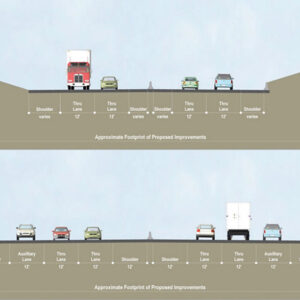
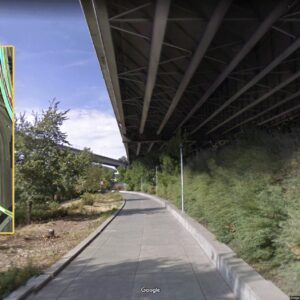

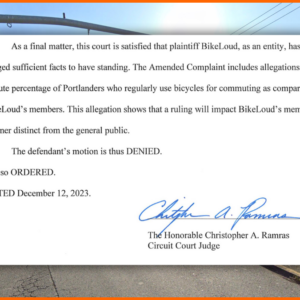
Thanks for reading.
BikePortland has served this community with independent community journalism since 2005. We rely on subscriptions from readers like you to survive. Your financial support is vital in keeping this valuable resource alive and well.
Please subscribe today to strengthen and expand our work.
Bingo, this is exactly why dubious construction projects are constantly done in the Metro area. Max trains, freeway expansion, convention center expansions, convention center hotel, no temporary/transitional housing, etc.
Does anyone know why ODOT is in such a hurry to do projects that no one wants? Who is the benefactor?
Brandon,
The entire ODOT system is set up to do these kind of projects. At its heart ODOT is a highway building business and they have billions of dollars and 1000s of staffers on the line to continue to be. Yes, there are people there who want to be a different kind of agency, but that change is not happening fast enough. And there are other factors at play here too. Politics is a big one. Money and corporate interests of the freeway building industrial complex have their teeth sunk well into Salem and top brass at ODOT and the OTC. There’s a lot of money behind these projects and a lot of jobs, which is one reason you Dems supporting them (because of construction unions). Unfortunately that’s a totally misguided stance because we could create more and better jobs and still take care of the planet and our lives if we built other types of things. It’s just that — to my first point – the ENTIRE system is set up to favor freeway building and expansions so it’s really hard to shift away from the inertia of historical status quo. That’s why the work of No More Freeways is so crucial because they can help shift the Overton Window and help more people see that another way is possible.
Well said, JM. A shorter version: When your only tool is freeway construction equipment, then the solution to every problem is … a freeway.
That is also why BP, No More Freeways. Joe Cortright, and others need support. I think with more support, the public will “see” what is apparent to those who have seen the most – the ones who walk and bike. They just got educated sooner. It will take more effort, but those who see cities from a windshield will get it. The more support to BP, No More Freeways, and others like them, the sooner they will see and the sooner the momentum will shift. Yea for Bike Portland.
How do you think goods get to you ? Maybe we should just reroute the freeways around and away from Portland with gates to keep all of in .
If you want to donate to “No More Freeways” here’s the link from their site:
https://nomorefreewayspdx.com/
https://portlandtransport.com/freeway-fund
Who is no one? A few people showing up at ODOT every so often probably doesn’t move the needle. Maybe if they showed up to the Governor’s house it may. Why push it through? Costs go up everyday, more delays, more money. Geez, to think how much housing we could’ve built with the wasted money so far, well, I really don’t want to know.
just wanna point out that a bunch of teenage climate activists in fact held a protest outside the Governor’s office. There’s an awful lot of us building power and doing demonstrations to try and get attention to ODOT’s shenanigans and we hope you’ll join us! http://www.nomorefreewayspdx.com
A bunch of teenage climate activists who actively supported Governor Brown’s re-election protested outside of Governor Brown’s office.
Rince, repeat.
Who benefits. Take a look at the consultants. Take a look at the lead consultant on the project. Go to Linkedin and check out who two former Portland Mayors work for. Then do some simply math on the profit potential. Ten minutes and you will know who is driving the project and why they are selling the public and why they hired the former mayors to help. The mega-consultant firms are big business making lots of profit. Yes, other factors are at play, but their expertise is what accounts for the lunacy. They have the expertise and the motive. Like a lot of corporate America, they are top notch at sales. In many ways, they are no different than Big Pharma. In one case, you have unhealthy cities. In the other unhealthy people.
I’m old enough to remember when this was a $400 million project. It’s almost like they’ve been misleading us from the very beginning.
This isn’t a mistake it’s unheard of. If you did this in a document production for a lawsuit you could lose the case. The only reason ODOT isn’t in more trouble is because there’s basically no legal path for the judge to hold them accountable.
This is further proof that ODOT has utter contempt for the public in these matters. I’m starting to think the only solution is to clean house.
ODOT is being sketchy af. Will this revelation make a difference to the people that live outside of Portland who want to be able to drive as fast as possible to their suburban homes regardless of the impact the expansion will have to the surrounding communities? To be seen, but not holding my breath.
It’s hard to think of anything more blatantly dishonest and corrupt than rewriting a public document before releasing it and claiming it’s the original.
Separately from the article’s main point, in the document ODOT twice mentions “the Willamette River Greenway Trail” when referring to the Eastbank Esplanade. The Willamette River Greenway Trail is the trail on the WEST side of the river. Even in 2019, ODOT had already done substantial work on this project, yet still didn’t know the name of the (very major) eastbank path it was impacting.
It shows how anything outside the freeway on this project is an afterthought to ODOT.
File this away as an example of how [dialed in] most BP commenters are with the CURRENT [legal] realities of the state as a whole. I think there were [many] BP articles over the past [years] focused on rising opposition among activists over [ODOTs misinformation] and in the end it [registered as a legal defeat for ODOT in the judicial system].
BP is crushing it in political coverage this week! Thank you, Taylor.
This is so corrupt: how does anyone trust an agency that potentially committed fraud in response to a public records request with a billion dollar freeway project? If anything, more people need to be sounding the alarm on what else ODOT is hiding.
Just curious how many people were terminated for unethical practices at odot that cost taxpayers thousands in legal fees? Guessing less than 0.
And…just imagine if odot put 1/10th the effort into making Dutch style architecture and infrastructure with all the money they have…just imagine…
ODOT’s dishonesty is baked in. When I read that they were calling the added lanes “auxiliary lanes,” I knew we were all in trouble.
I think that you and Mark Smith have ODOT wrong. They are good, well meaning public servants. They have an organizational culture that cannot change. The shift from rural America to urban America was too fast for their bureaucracy and mindset to change. Freeways were great for rural America. Not great for urban America. The people in ODOT are good. The bureaucracy is evil. Flat evil.
Ok, as soneone who cannot afford to live in the city. I completly disagree with the statement that walking and biking are the solution. This is short sighted and elitist at worst. I’m a blue collar construction worker who commutes to where ever the work is that week. I don’t know anyone personally that thinks traffic has improved the past 20 years or so that alternate transportation that has been heavily supported is working.
Until we have a better solution doing nothing or building more of things that don’t work are not helping. I am not Intrested in building more max trains that no one or very few people use. I am not Intrested in building pedestrian only bridges that sit empty all day while all of the other bridges are maxed out in disrepair.
I personally travel 35 to 50 miles one way to the job site.
As a cyclist how much in taxes do you contribute to roads or bike paths? Zero is how much because a large part comes from fuel tax.
You can attack my response, just try to remember everyone is entitled to their opinion.
Let me close by saying, things do need to change.
Chris, glad you spoke up. I hope you don’t get attacked with your comment as it gives very good insight on issues like freeway expansion
There isn’t really such a thing as a “road tax”. You pay a gas tax, both state and federal, which partially fund roadway construction and maintenance. I pay (by proxy – I’m a renter) property tax which funds things like local roads, etc. I also pay income, and other taxes which end up in general funds that may or may not pay for transportation. Fun fact – fuel taxes in the US are essentially the lowest in the developed world despite having the largest highway network in the world.
I have no doubts that you need to drive to your job. But not everyone has to do that? And supporting alternative modes of transportation helps gets cars off the road, and would make your commute have less traffic. Most trips by car in the US are less than 5 miles, and those are the ones that are most pertinent for walking and cycling.
Citation needed. Portland streets and Oregon highways are not funded in any meaningful way by property tax or income tax.
My personal experience with ODOT staff is that most are “good, well meaning public servants”, but others definitely are not, at least not all the time.
Responded to a public records request by rewriting a document and passing it off as the original isn’t the behavior of a “good, well meaning public servant”, and can’t be excused by the “organizational culture” being flawed.
Keep in mind that I said “most” are good. The bad ones are made much worse by the bad organization. Lots of examples of people doing bad things because of organization culture. Lots of examples of bad organizations blaming a “fall guy’ to hide the fact that their organizations are bad. Focusing on the bad apples is not going to change the bad culture – unless of course you sue them or riot, which I would be happy to see anytime it happens with any DOT. I think the lawsuit mentioned in this article was GREAT. Wish there were more of them.
You said, “THEY are good…” and you said, “THE PEOPLE in ODOT are good”. Where did you say “most”?
And I wouldn’t call anyone at ODOT who falsifies a public record a “good, well meaning public servant”, no matter how bad ODOT’s organizational culture may be.